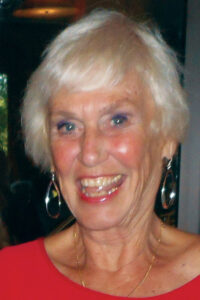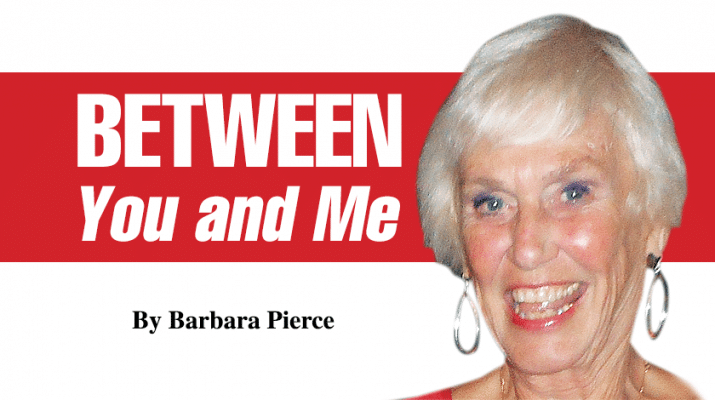By Barbara Pierce
 Things are bleak these days. Warring nations, global warming, inflation, the shameful state of politics in the U.S — you know the dismal list.
Things are bleak these days. Warring nations, global warming, inflation, the shameful state of politics in the U.S — you know the dismal list.
I’m generally an optimistic person, expecting that things will turn out right for me. I have confidence in my ability to handle most of whatever life throws at me (usually).
But now it feels impossible to maintain any sense of optimism, or hope, about the future. Beginning a new year, I’d like to feel hope.
I want to imagine that the future will be better. I need to do that for my own feelings of well-being. Being hopeful is association with a wide array of health and life benefits, say experts. Our capacity for hope is one of the strongest predictors of well-being.
“Hope,” according to the dictionary, “is an optimistic state of mind, based on an expectation of positive outcomes in one’s life or in the world at large.”
It helps to learn that there are two parallel lines of thoughts about hope: it’s an expectation of good outcomes in the world at large and in one’s personal life.
Regarding finding hope in the world at large, I like this perspective I found online from Joan Halifax of the Zen Center in New Mexico:
“Wise hope is seeing things as they are and facing them,” she said. “Wise hope seems to be more achievable and very relevant in these troubled times. Wise hope doesn’t mean denying the present realities. It means facing them, addressing them, and remembering what else is present.”
What I’ve learned from that is, first, I need to acknowledge what’s going on in the world. OK, I’ve done that.
Next, I need to look at what I can do to change the situation. I do recycle; perhaps I can learn about more things I can to do for climate change. And I can prepare my grandchildren to face the adversities they may have to confront.
Regarding other things going on in the world that I despair about, there is nothing I can do about them. I need to accept I’m doing all I can and step back, let go. If I can do nothing about these situations, I will acknowledge my concerns, then move on. Why lament about things I can do nothing about?
Remembering what else is present in my life is how to feel wise hope. There are many things to be grateful for every day. I believe that practicing gratitude will bring me a more hopeful spirit. Gratitude about the little things in my life.
There’s evidence that the absence of positive thoughts has a greater negative impact on our feelings of well-being than the presence of negative ones. That’s significant. Thinking positive thoughts is more helpful than getting rid of negative thoughts.
I must to focus on all the good things in my life right now and appreciate every moment of every day. The wonderful cup of coffee I just had; the opportunity to go for a walk; spending time with my friend at lunch.
The other part of hope is hope in my personal life. Trust in my ability to handle things that may come along.
Remembering I’ve had bleak periods in my life before. I’ve coped. I’m strong, able to meet adversity. I’ve got this.
Other strategies to cultivate hope:
Limit your bad news intake. With regular doses of war, disasters, crime, scandals, no question that the news is bad for our health. Watching has direct, measurable effects on our bodies: higher adrenaline levels, elevated blood pressure. When you stop watching the news, your life will improve almost overnight, they said. You’ll feel less anxiety, anger, sadness and insomnia. It’s one of the easiest ways to protect your feelings of well-being.
Surround yourself with positive people: You probably know at least one person who persistently sees the bright side of life. And you probably know others who leave you drained. Get in touch with that positive person for a boost. If you don’t have anyone in your life like that, what could you do to them to your life?
My friend, Mary Lou, is like that. Every time I talk about my despair about the U.S., she reminds me our country has survived difficult divisions before, like the Civil War. She’s a history teacher and knows the other low points in our history — the 1930s Depression, the Vietnam War. What’s happening now is not the end of the story; it’s just what we can see at this moment.
Denial isn’t always a bad thing. A healthy dose of denial can improve one’s outlook, according to some. Mental health requires some self-deception. It can be a healthy option to protect yourself. Sometimes denial is essential; it can give you time to accept a significant change in your life.
Wise hope is a realistic expectation that something good will happen and your life is on the right track. Think I’ve got it!
 Barbara Pierce is a retired licensed clinical social worker with many years of experience helping people. If you would like to purchase a copy of her book, “When You Come to the Edge: Aging” or if you have questions for her, contact her at barbarapierce06@yahoo.com.
Barbara Pierce is a retired licensed clinical social worker with many years of experience helping people. If you would like to purchase a copy of her book, “When You Come to the Edge: Aging” or if you have questions for her, contact her at barbarapierce06@yahoo.com.

